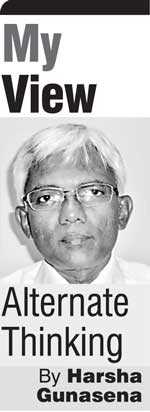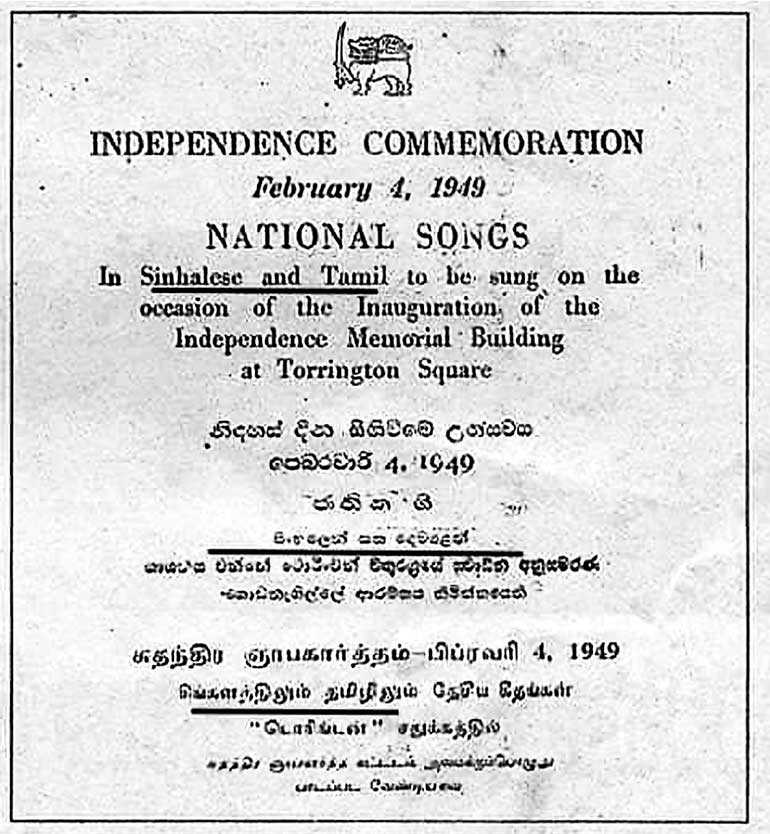Wednesday Feb 25, 2026
Wednesday Feb 25, 2026
Saturday, 28 December 2019 00:05 - - {{hitsCtrl.values.hits}}

 On 24 December, the Daily Mirror reported that, according to the Public Administration Ministry, the 72nd Independence Day celebrations will be held on 4 February at Independence Square in Colombo on a grand scale and the national anthem would be sung only in Sinhala.
On 24 December, the Daily Mirror reported that, according to the Public Administration Ministry, the 72nd Independence Day celebrations will be held on 4 February at Independence Square in Colombo on a grand scale and the national anthem would be sung only in Sinhala.
This is a deviation from the practice followed by the previous government from 2016 that the National Anthem should be sung in Sinhala and Tamil at the Independence Day celebrations.
Legal perspective
Legal perspective is clear in this respect.
In the first constitution of independent Sri Lanka referred as Soulbury Constitution, there was no reference to the National Anthem. However, at the Independence Day celebrations held on 4 February 1949 the present National Anthem was sung in both Sinhala and Tamil as national songs. At that time, it was slightly different. It was officially accepted by the Government in 1951 as the national anthem and was sung at the Independence Day celebrations in 1952. The Tamil version was widely used in the Tamil speaking areas.
In the constitution adopted in 1972 also there was no reference to the National Anthem. It was incorporated into the constitution for the first time in 1978.
Article 7 of the present constitution is as follows: “The National Anthem of the Republic of Sri Lanka shall be ‘Sri Lanka Matha’, the words and music of which are set out in the Third Schedule.”
The English translation of Article 7 of the Tamil version of the constitution is as follows: “The National Anthem of the Republic of Ilangai shall be ‘Sri Lanka Thaaye’, the words and music of which are set out in the Third Schedule.”
Sri Lanka is referred as Ilangai in Tamil. The national anthem referred in the constitution in Tamil was Sri Lanka Thaaye, the Tamil translation of the Sinhala version Sri Lanka Matha.
In Third Schedule the national anthem begins as ‘Sri Lanka Thaaye’. This was intentional and reflected the thinking prevailed from the time of the independence.
The Constitution of Sri Lanka, unlike Acts of Parliament, contains no provision which stipulates that the Sinhala text shall prevail over the Tamil text.
In 2016 there was a Fundamental Rights application challenging the decision to sing Tamil version of the National Anthem at the Independence Day celebrations. (SC FR 67/2016) It was dismissed by the Supreme Court..
During the time of the war the National Anthem was not sung in the LTTE controlled areas. It was banned by the LTTE. Soon after the end of the war, Tamils started singing the National Anthem in Tamil. The Mahinda Rajapaksa regime in 2010 decided that the National Anthem can be sung only in Sinhala
The National Anthem was sung in Tamil at the 68th Independence Day celebrations on 4 February 2016. On the same day then Chief Minister of Northern Province, C.V. Vignasvaran, went to Naga Viharaya and participated in religious ceremonies as a mark of reciprocal respect. This shows to what extent the Tamils appreciated the symbolic act of the Government
Political perspective
During the time of the war the National Anthem was not sung in the LTTE controlled areas. It was banned by the LTTE. Soon after the end of the war, Tamils started singing the National Anthem in Tamil. The Mahinda Rajapaksa regime in 2010 decided that the National Anthem can be sung only in Sinhala.
The National Anthem was sung in Tamil at the 68th Independence Day celebrations on 4 February 2016. On the same day then Chief Minister of Northern Province, C.V. Vignasvaran, went to Naga Viharaya and participated in religious ceremonies as a mark of reciprocal respect. This shows to what extent the Tamils appreciated the symbolic act of the Government.
In 1950s the Government introduced the word ‘Sri’ to the vehicle number plates and the Tamils rejected it and continued to use old vehicles bearing English letters in the number plates. Now we have discontinued the use of Sri in the number plates. In 1956 we made Sinhala the only official language of Sri Lanka. Subsequently in 1958 the Tamil Special Provisions Act was passed. Tamil was not recognised as an official language even in the constitution of 1972 which was one of the reasons for the birth of Tamil militancy. However, in 1978 constitution Tamil also recognised as an official language.
This shows how stupidly the successive Governments and their followers thought. They allowed things to aggravate facilitating a lot of damages in the process rather than nipping the bud at the initial stages. We as a country have always paid a very high price for simple and basic things.
In India, the national anthem is sung in Bengali not in Hindi which is spoken by the majority. In Singapore where the majority is Chinese, the national anthem is sung in Malay. The Canadian national anthem is sung in English and French. In New Zealand the national anthem is sung in English and Maori. The usual practice when performed in public is to perform the first verse of the national anthem twice, first in Māori which is an indigenous language and then in English. In South Africa it is sung in five different languages. There are many other countries where the national anthems are sung in two or three languages.
Historical perspective
Sri Lanka at present is a divided country by the ethnicity and religion. The history of the country was not the same.
In the introduction of his great book, ‘Ways of Thinking of Eastern Peoples’, published in 1964, Hajime Nakamura stated as follows about Eastern thought vis-a-vis Western thought: “Accordingly, when various thoughts are found opposed to one another, they are likely to recognise their rational force, and to compromise and synthesise, rather than to adopt one of them alternatively to the exclusion of others. Therefore, it is often contended that in contrast to Western thought the spirit of tolerance and mutual concession is a salient feature of Eastern thought. The religion of the West at times is harsh and even emphasises struggle for the sake of keeping the faith and condemning unbelievers.”
Easterners are basically collectivists in contrast to western individualists. In Sri Lanka for millennia different ethnicities and different religions lived in harmony. Their collective included all the people living in the kingdom irrespective of their ethnicity or religion.
Over millennia, in Sri Lanka there were no clashes between Sinhalese and Tamils as ethnic groups. The clashes were among the kings and princes. They were concerned about their power and not the ethnicity. General perception is that Elara has done more damage to us in comparison to Magha, who ruined our civilisation in 13th century. Magha was not a Tamil and Elara was respected even by Mahavamsa. Sinhala kings got support from the Pandyans to attack Chola invaders, both were South Indians.
In the 12th century on the orders of Vijayabahu the Great, the commander of the army erected a slab inscription written in Tamil ordering Velaikkara regiment who were of Tamil origin to protect the Tooth Relic, control of which was considered essential to claim the authority to rule the kingdom.
This act shows that the State had given a very important task to the soldiers of Tamil origin and the State did not hesitate to communicate with them in their language. This was neglected by the post-independence rulers of Sri Lanka till 1978.
In the introduction of the landmark book, ‘The Muslims of Sri Lanka – one thousand years of ethnic harmony 900-1915’, Lorna Dewaraja stated as follows: “It is clear from our evidence at our disposal that right through out from the Anuradhapura period to Kandyan times there was a Muslim lobby operating in the Sri Lanka court.”
In the body of the book she said, “For instance, Muslims served as officials in the administration of the state as well as of the Buddhist monasteries. It is noteworthy that the Muslims were functionaries in the Temple of the Tooth and participated in the ritual of the Asala Maha Perahera, the greatest pageant of the Buddhist world. This process of structural assimilation which took place without any erosion of the cultural distinctiveness of the Muslims is perhaps unique in minority-majority relations.”
Referring to the Kandyan kingdom she said, “...This is striking example of the policy of live and let live characteristic of Sinhala society at that time. Muslims, Hindus, and Buddhists were voluntary participants in the festivities of the Embekke ‘devala’ and none of those groups lost their cultural identity in the process.”
This situation was changed during the British rule in late 19th century with the initiation of the Buddhist revival movement which was directed against the ruling British and their religion. However, it had taken a turn against the other ethnicities. Thus, the common collective of the country started cracking down and collective of different ethnicities and religions were established. The situation gradually deteriorated by using different collective identities against one another in order to get political gains.
Conclusion
Singing the National Anthem in Tamil is not unconstitutional and not against the common traditions followed by other countries. It is not against the historical traditions followed in Sri Lanka over millennia. It is in line with the initial actions taken by the State at the time that the country got independence. However, it is against the divisive political traditions introduced by the Sri Lankan political leaders subsequently.
The previous government, although coming to power with the political support of the Tamils and initiating processes such as creating a new constitution, has done very little to the Tamils. Singing the National Anthem in Tamil was one of the symbolic acts they have initiated. It is a joyful act to sing it in both languages and it harmonises the different ethnicities in Sri Lanka.
President said that he will be the President of all including those who did not vote for him. He can now turn his words to deeds. Therefore, it is the duty of the Government to decide to sing the National Anthem in both languages at the Independence Day celebrations if they place the objectives of the country ahead of their own political objectives.
